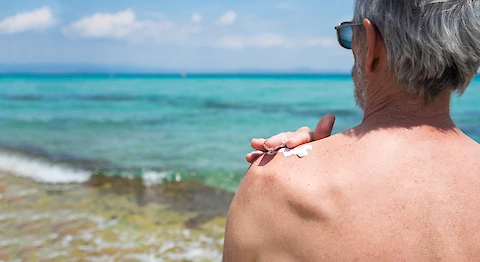
Spending time outdoors is essential for your senior loved one's well-being and overall health, which is why it's necessary to understand how to protect their skin from the sun. Our bodies create Vitamin D when exposed to the sun's UV rays and it brings many benefits like strengthening bones as well as immune systems. However, it's best to rely on foods such as fish and eggs for our daily dose of Vitamin D rather than the sun. As we age, our skin becomes weaker, dryer, and loses some of its protective fat layer which prolongs the healing process from cuts, bruises, and sun damage. Here is what you need to know about which SPF seniors should use in sunscreen.
What Is Sun Protection Factor (SPF)?
Contrary to popular belief, the SPF number you find on sunscreens has nothing to do with the amount of time you can be in the sun without getting burned, but rather a measure of how many UV rays are required before it produces a sunburn. In addition to the amount of sunscreen used, remember to consider the skin tone of your loved one. Fair-skinned people absorb more UV rays than those with naturally darker skin.
What to Look for in SPF
Start with finding a broad-spectrum sunscreen that protects against both UVA rays (associated with skin aging and penetrating the skin deeper) and UVB rays (associated with skin burning). Both are harmful and cause skin damage that leads to skin cancer. The older we are, the more sun exposure we've had, so it's important to use lotions with at least SPF 30 no matter what your age is. Seniors have more sensitive skin, so gentle lotions with no added chemicals or scents are less likely to cause irritation.
SPF Best Practices
At least one in five Americans will develop skin cancer by the age of 70. This is something that tends to get overlooked in our younger years. Luckily, it is also something that we can start being proactive about at any age. Here are additional safety tips not just for older adults, but for everyone.
- Wear protective clothing. While SPF is a great way to protect your skin, wearing long sleeves and wide-brimmed hats are additional measures to take while spending time in the sun. Polyesters and nylons are fabrics to consider that offer more protection than other fibers.
- Reapply sunscreen. This may go without saying but it's important to reapply every two hours and/or after sweating or swimming it off.
- Read medication labels. Some medications make not only our skin but our bodies more sensitive to the heat and sun. Always consult with your medical professional if you are planning to be in the sun for longer periods of time.
- Moisturize and hydrate after sun exposure. Aging skin loses moisture more easily. This will bring relief and comfort as well as help with skin elasticity.
- Limit time in the midday sun. The sun is the strongest between 10 a.m. and 4 p.m. If you plan on being outside during these times, pack an umbrella or go somewhere that has shade.
Conclusion
Senior Helpers Asheville offers a comprehensive suite of programs and services that support aging-in-place.